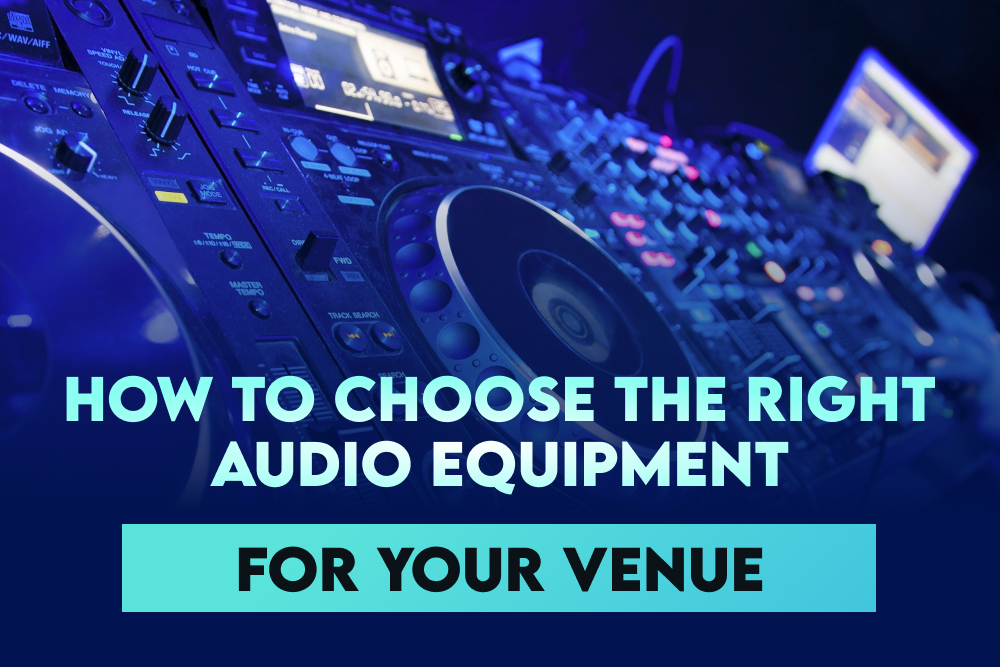

Head of HR at Rent For Event

Head of HR at Rent For Event
Whether you are organizing a concert, conference, or any other event, having high-quality audio is always crucial. It’s integral for creating a successful and memorable experience.
So in this blog post, we will explore the most suitable audio equipment for your specific needs. From the audio equipment list to expert tips, we’ve got you covered!

Before delving into the technical aspects, it is essential to have a clear understanding of the requirements of your event. You should consider some factors, including the following:
The size of your venue and its seating capacity will determine the type and power of audio equipment needed. Massive venues may require equally large venue sound systems with higher wattage to ensure adequate coverage.
Consider whether your event will be indoors or outdoors and whether it is a music concert, conference, wedding ceremony, or corporate gathering. Different events have varying audio requirements. For example, outdoor concerts may require weather-resistant speakers with increased volume capabilities.
Understanding the acoustics of your venue is crucial in selecting appropriate audio equipment. Venues with poor acoustics may require additional sound treatment solutions. This may include acoustic panels or diffusers to enhance sound quality.
Each venue has its unique characteristics that may present challenges when it comes to audio setup. Factors such as ceiling height, architectural elements, and existing sound systems need to be considered for optimal sound distribution.
By thoroughly analyzing these factors, you choose the right sound system for your venue. It will also ensure that your guests will have a positive experience attending the event.
To make the right choices, it is essential to understand the basics of audio equipment. Here are the key components you may need:
Microphones capture sound and convert it into an electrical signal. Different types of microphones, such as dynamic and condenser microphones, have different characteristics. You must assess which is the most suitable for various applications in your venue.
Speakers reproduce sound by converting electrical signals into audible sound waves. They come in various sizes and configurations, including passive and active speakers. You should consider factors such as speaker coverage, dispersion patterns, and frequency response when choosing speakers for your venue.
Amplifiers provide power to speakers to produce sound at appropriate volumes. Matching your amplifiers with speakers is crucial to ensure optimal performance and prevent damage.
Mixers allow you to control multiple audio sources and adjust their levels individually. They enable you to balance different channels such as microphones, instruments, or playback devices.
Signal processing devices, including equalizers, compressors, and effects processors, enhance the audio signal. These devices help achieve better tonal balance, dynamic control, and creative effects if desired.
Overall, these are just some of the components you may need on your sound system equipment list. If you don’t know what you need, we suggest talking to a full AV production company. This expert can assess your venue and provide all your needed audio gear together with a complete setup.
Now let’s dive into a step-by-step process for choosing the right audio equipment based on your specific needs:
Setting a realistic budget is crucial when selecting audio equipment for your venue. Here are some factors to consider:
Whether it’s audio equipment for a concert or a PA setup for a small venue, hiring the right provider is the key. Selecting a reliable audio equipment provider is crucial to ensure smooth operations during your event. Here are some key factors to consider:
By considering these factors when choosing an audio equipment provider, you can ensure a smooth collaboration. It will also minimize potential risks during your event.
To wrap it up, here are some final tips to help you achieve a seamless audio setup:
Remember that selecting the right audio equipment is crucial, but it doesn’t end there. Proper setup, maintenance, and troubleshooting are equally important for achieving exceptional sound quality.
Choosing the right audio equipment for your venue is essential to creating a successful event. Start by assessing the size, layout, and acoustic characteristics of your space. Also, should consider your budget and choose equipment that fits your needs while maintaining quality.
Aside from that, you must look for user-friendly options that can be easily operated by your team. Think about scalability and adaptability to accommodate future expansion or changes.
By selecting the right audio equipment, you can create an immersive auditory experience. It will enhance the event and leave your attendees satisfied. Remember to prioritize clarity, quality, and compatibility with your venue to deliver an exceptional sound experience.
Above all, you shouldn’t hesitate to seek professional advice for valuable insights and to ensure optimal results. Sound engineers and technicians will take away the guesswork, no matter how small or large your venue is.